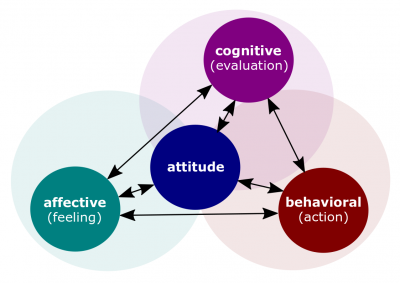Difference between revisions of "Attitude"
| (7 intermediate revisions by 2 users not shown) | |||
| Line 1: | Line 1: | ||
[[File:Attitude.png|400px|thumb|right|[[Attitude]]]][[Attitude]] is an evaluative statement or judgment, either favorable or unfavorable, concerning objects, people, or events. | [[File:Attitude.png|400px|thumb|right|[[Attitude]]]][[Attitude]] is an evaluative statement or judgment, either favorable or unfavorable, concerning objects, people, or events. | ||
| + | |||
==Definitions== | ==Definitions== | ||
According to [[Organizational Behavior by Robbins and Judge (17th edition)]], | According to [[Organizational Behavior by Robbins and Judge (17th edition)]], | ||
:[[Attitude]]. An evaluative statement or judgment concerning objects, people, or events. | :[[Attitude]]. An evaluative statement or judgment concerning objects, people, or events. | ||
| + | According to [[Management by Robbins and Coulter (14th edition)]], | ||
| + | :[[Attitude]]. An evaluative statement, either favorable or unfavorable, concerning objects, people, or events. | ||
| + | According to [[Marketing Management by Keller and Kotler (15th edition)]], | ||
| + | :[[Attitude]]. A person's enduring favorable or unfavorable evaluation, emotional feeling, and action tendencies toward some object or idea. | ||
==Components== | ==Components== | ||
| − | *[[Cognitive | + | *[[Cognitive attitude]]. That part of an ''attitude'' that's made up of the beliefs, opinions, knowledge, or information held by a person. In other words, the ''cognitive component'' is the opinion or belief segment of an ''attitude''. |
| − | *[[Affective | + | *[[Affective attitude]]. The emotional or feeling segment of an ''attitude''. |
| − | *[[Behavioral | + | *[[Behavioral attitude]]. The segment of an ''attitude'' that refers to an intention to behave in a certain way toward someone or something. |
| + | |||
| + | ==Cultural attitude== | ||
| + | :''Main wikipage: [[Cultural attitude]]'' | ||
| − | ==Related | + | ==Related lectures== |
*[[Individual Decisions Quarter]]. | *[[Individual Decisions Quarter]]. | ||
| − | [[Category: Septem Artes Administrativi]][[Category: Articles]] | + | [[Category:Marketing Management]][[Category:Management]][[Category: Septem Artes Administrativi]][[Category: Articles]] |
Latest revision as of 18:59, 12 May 2023
Attitude is an evaluative statement or judgment, either favorable or unfavorable, concerning objects, people, or events.
Definitions
According to Organizational Behavior by Robbins and Judge (17th edition),
- Attitude. An evaluative statement or judgment concerning objects, people, or events.
According to Management by Robbins and Coulter (14th edition),
- Attitude. An evaluative statement, either favorable or unfavorable, concerning objects, people, or events.
According to Marketing Management by Keller and Kotler (15th edition),
- Attitude. A person's enduring favorable or unfavorable evaluation, emotional feeling, and action tendencies toward some object or idea.
Components
- Cognitive attitude. That part of an attitude that's made up of the beliefs, opinions, knowledge, or information held by a person. In other words, the cognitive component is the opinion or belief segment of an attitude.
- Affective attitude. The emotional or feeling segment of an attitude.
- Behavioral attitude. The segment of an attitude that refers to an intention to behave in a certain way toward someone or something.
Cultural attitude
- Main wikipage: Cultural attitude
